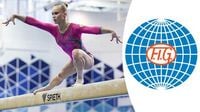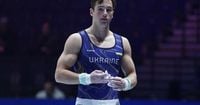In a significant shift within the world of gymnastics, former Ukrainian national team gymnast Pantelei Kolodiy has officially changed his citizenship to American, as confirmed by the International Gymnastics Federation (FIG). This decision was made during the FIG Executive Committee meeting held in Malta on May 7-8, 2025. Kolodiy, who is just 23 years old, had been a prominent member of the Ukrainian gymnastics team until 2022, showcasing his talents on international stages such as the 2022 World Championships, the 2022 European Championships, and the Universiade.
Kolodiy's journey in gymnastics has been marked by notable achievements, including being awarded the title of "Master of Sports of Ukraine" in December 2022. However, his last appearance representing Ukraine was in September 2023 at the World Cup stage in Szombathely, Hungary. Following his citizenship change, Kolodiy will not be eligible to compete under the American flag until May 2026, which raises questions about his immediate competitive future.
In a parallel development, the FIG also approved the change of citizenship for former gymnast Ekaterina Vedeneyeva, who switched her allegiance from Slovenia to Russia. Vedeneyeva, now 30, is currently serving as a judge in rhythmic gymnastics. She was born in Irkutsk and represented Russia until 2018 before competing for Slovenia. Vedeneyeva has made a name for herself in the sport, winning bronze medals at the World Championships in 2022 and 2023, as well as at the European Championships in 2023.
The FIG Executive Committee's meeting was crucial for athletes navigating the complexities of international representation. Notably, the committee did not discuss the ongoing situation regarding Russian athletes and their neutral status, which has become a contentious issue within the sport. The Russian Gymnastics Federation (FGR), in collaboration with the Russian Olympic Committee (ROC) and the Ministry of Sports of Russia, continues to advocate for its athletes, aiming to challenge what they describe as discriminatory decisions made by FIG.
FGR President Oleg Belozerov previously expressed optimism about being able to present their case at the FIG meeting, emphasizing the need for a review of the rules governing neutral status. However, the lack of discussion on this topic during the meeting has left many athletes in limbo regarding their competitive futures.
As part of the ongoing dialogue, all Russian gymnasts who had received neutral status from FIG have decided to refrain from participating in upcoming international competitions. This decision stems from what they describe as "numerous and unreasonable refusals" of their colleagues from the Russian national team. While the FGR has not specified which athletes faced refusals, the ambiguity has fueled speculation and concern among the gymnastics community.
Amidst these developments, the FIG has also updated its list of athletes granted neutral status, which now includes several gymnasts, such as Leila Vasilyeva in sports gymnastics and rhythmic gymnasts Alexandra and Maria Borisova, Milena Bukina, Anna Vakulenko, Anastasia Ivanova, Karolina Pakhtusova, Ksenia Savinova, Polina Semenova, Arina Tkachuk, Victoria Chumakova, and Ulyana Yanus. These athletes are now positioned to compete without national affiliation, but the uncertainty surrounding their status continues to loom large.
The situation is further complicated by the challenges faced by Russian judges, who have been unable to participate in FIG events due to visa issues. This absence not only affects the judging landscape but also raises questions about the integrity of the competitions themselves, as teams typically bring their own judges to ensure fair evaluations.
As the gymnastics world watches these developments unfold, the implications for athletes like Kolodiy and Vedeneyeva highlight the broader tensions within the sport. With Kolodiy's transition to representing the USA and Vedeneyeva's return to Russian representation, the landscape of gymnastics is evolving rapidly.
Looking ahead, the FIG's next steps regarding neutral status and international participation will be critical in shaping the future of gymnastics. As athletes and federations navigate these complex waters, the need for clear communication and fair treatment remains paramount. The gymnastics community hopes for a resolution that honors the spirit of competition while addressing the unique challenges posed by geopolitical tensions.





